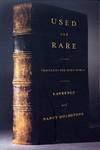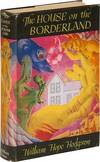
A Letter of Benjamin Franklin, Esq: to Mr. Peter Collinson, F.R.S. concerning an electrical Kite. WITH: A Letter from Mr. Franklin to Mr. Peter Collinson, F.R.S. concerning the Effects of Lightning
by FRANKLIN, BENJAMIN
- Used
- first
- Condition
- See description
- Seller
-
New York, New York, United States
Payment Methods Accepted
About This Item
London: C. Davis, 1753. First edition. Contemporary calf. FIRST PRINTING OF BENJAMIN FRANKLIN'S ACCOUNT HIS KITE EXPERIMENT, ONE OF THE MOST FAMOUS SCIENTIFIC EXPERIMENTS IN AMERICAN HISTORY.
WITH AN EARLIER PAPER DISCUSSING HIS THEORIES OF THE NATURE OF LIGHTNING. "Franklin was the first American scientist to achieve an international reputation, with his work on electricity...The most dramatic result of Franklin's researches was the proof that lightning is really an electrical phenomenon. Others had made such a suggestion before him - even Newton himself - but it was he who provided the experimental proof. In 1752 he flew a kite in a thunderstorm and attached a key to its string. From this he collected electrical charges in a Leiden jar and showed that atmospheric and frictional or machine-made electricity are the same. He went on to propose the fixing of iron rods at the top of buildings, masts of ships, etc., from which he conducted the electric charges they collected from lightning into the wet subsoil - the invention of the lightning conductor" (Printing and the Mind of Man, 199).
"Franklin imagined that he might be able to obtain the same evidence [that lightning is electrical] by flying a kite at the approach of a thunderstorm. In June 1752, as dark clouds came up, he tried the kite experiment. He knew the hemp string attached to the kite would conduct electricity. Franklin ran the string from the kite to a Leyden jar, insulating himself by holding a silk ribbon to the string. When he observed the fibers on the hemp string stand out, he realized the experiment had succeeded. It must have been one of the most satisfying moments of his life. Franklin had proven electricity to be a basic element of nature. In late July he learned of the sentry box experiment's success in France. 'This engag'd the public Attention everywhere' (Autobiography, p. 133). Franklin became the most famous natural philosopher since Isaac Newton, and, in the popular mind, more so, since Newton's theories were not generally understood nor their profound significance widely recognized. In 1756 Immanuel Kant dubbed Franklin the 'Prometheus of modern time' (Papers, vol. 20, p. 490). American National Biography.
Also includes a review of the first part of Franklin's Experiments and Observations on Electricity (pp. 202-211) and a letter from William Watson (pp. 567-570) discussing Franklin's experiments.
IN: Philosophical Transactions, Vol 47, for the years 1751 and 1752; pp. 289-291 (Letter Concerning the Effects of Lightning), pp. 565-567 (Letter Concerning an Electrical Kite). The whole volume offered. London: C. Davis, 1753. Octavo, contemporary full calf, elaborately gilt-decorated spines. New volume spine label (in antique style), nearly invisible repairs to binding extremities/joints. Remnants of old paper label at base of spine. Foxing to general title, otherwise text generally very clean with usual occasional foxing and toning.
A HANDSOME COPY IN EXQUISITE CONTEMPORARY BINDING.
WITH AN EARLIER PAPER DISCUSSING HIS THEORIES OF THE NATURE OF LIGHTNING. "Franklin was the first American scientist to achieve an international reputation, with his work on electricity...The most dramatic result of Franklin's researches was the proof that lightning is really an electrical phenomenon. Others had made such a suggestion before him - even Newton himself - but it was he who provided the experimental proof. In 1752 he flew a kite in a thunderstorm and attached a key to its string. From this he collected electrical charges in a Leiden jar and showed that atmospheric and frictional or machine-made electricity are the same. He went on to propose the fixing of iron rods at the top of buildings, masts of ships, etc., from which he conducted the electric charges they collected from lightning into the wet subsoil - the invention of the lightning conductor" (Printing and the Mind of Man, 199).
"Franklin imagined that he might be able to obtain the same evidence [that lightning is electrical] by flying a kite at the approach of a thunderstorm. In June 1752, as dark clouds came up, he tried the kite experiment. He knew the hemp string attached to the kite would conduct electricity. Franklin ran the string from the kite to a Leyden jar, insulating himself by holding a silk ribbon to the string. When he observed the fibers on the hemp string stand out, he realized the experiment had succeeded. It must have been one of the most satisfying moments of his life. Franklin had proven electricity to be a basic element of nature. In late July he learned of the sentry box experiment's success in France. 'This engag'd the public Attention everywhere' (Autobiography, p. 133). Franklin became the most famous natural philosopher since Isaac Newton, and, in the popular mind, more so, since Newton's theories were not generally understood nor their profound significance widely recognized. In 1756 Immanuel Kant dubbed Franklin the 'Prometheus of modern time' (Papers, vol. 20, p. 490). American National Biography.
Also includes a review of the first part of Franklin's Experiments and Observations on Electricity (pp. 202-211) and a letter from William Watson (pp. 567-570) discussing Franklin's experiments.
IN: Philosophical Transactions, Vol 47, for the years 1751 and 1752; pp. 289-291 (Letter Concerning the Effects of Lightning), pp. 565-567 (Letter Concerning an Electrical Kite). The whole volume offered. London: C. Davis, 1753. Octavo, contemporary full calf, elaborately gilt-decorated spines. New volume spine label (in antique style), nearly invisible repairs to binding extremities/joints. Remnants of old paper label at base of spine. Foxing to general title, otherwise text generally very clean with usual occasional foxing and toning.
A HANDSOME COPY IN EXQUISITE CONTEMPORARY BINDING.
Reviews
(Log in or Create an Account first!)
Details
- Bookseller
- The Manhattan Rare Book Company
(US)
- Bookseller's Inventory #
- 2434
- Title
- A Letter of Benjamin Franklin, Esq: to Mr. Peter Collinson, F.R.S. concerning an electrical Kite. WITH: A Letter from Mr. Franklin to Mr. Peter Collinson, F.R.S. concerning the Effects of Lightning
- Author
- FRANKLIN, BENJAMIN
- Format/Binding
- Contemporary calf
- Book Condition
- Used
- Quantity Available
- 1
- Edition
- First edition
- Publisher
- C. Davis
- Place of Publication
- London
- Date Published
- 1753
- Weight
- 0.00 lbs
- Keywords
- electricity, Philosophical Transactions, American science, Benjamin Franklin, kite experiment, Ben Franklin's kite
- Bookseller catalogs
- Science & Technology;
Terms of Sale
The Manhattan Rare Book Company
30 day return guarantee, with full refund including shipping costs for up to 30 days after delivery if an item arrives misdescribed or damaged.
About the Seller
The Manhattan Rare Book Company
Biblio member since 2010
New York, New York
About The Manhattan Rare Book Company
The Manhattan Rare Book Company offers fine books in all fields, specializing in the important, beautiful, and hard-to-find.
Glossary
Some terminology that may be used in this description includes:
- New
- A new book is a book previously not circulated to a buyer. Although a new book is typically free of any faults or defects, "new"...
- First Edition
- In book collecting, the first edition is the earliest published form of a book. A book may have more than one first edition in...
- Calf
- Calf or calf hide is a common form of leather binding. Calf binding is naturally a light brown but there are ways to treat the...
- Spine Label
- The paper or leather descriptive tag attached to the spine of the book, most commonly providing the title and author of the...
- Octavo
- Another of the terms referring to page or book size, octavo refers to a standard printer's sheet folded four times, producing...





